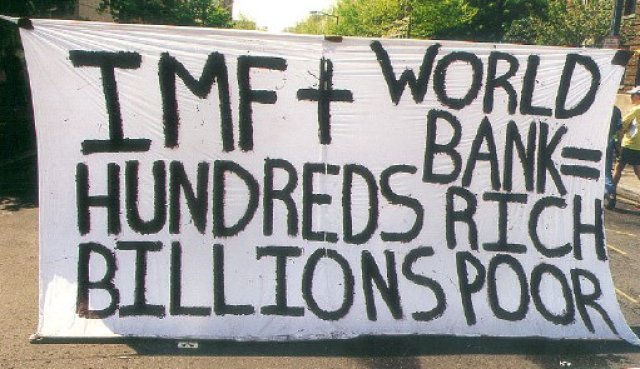
Isn't this excellent news? The International Monetary Fund (IMF) say the British government's strategy for sorting us out is going to work.
Every time they've been asked to comment on a country's economy they've insisted it must cut wages, restrict the unions and privatise everything. So the government must have been really nervous as to whether they'd approve of the strategy of cutting wages, restricting unions and privatising everything.
It must have felt like waiting for your A-level results.
If the IMF got a job as an agony aunt, and someone wrote, “Dear IMF, I am happily married with two adorable children, but lately have felt frustrated at being tied to the house, and wish I could escape. What should I do?”, they'd reply: “Dear Frustrated, your children yield no returns and must be sold to Balfour Beatty. You must move out of your house and use it to grow kidney beans for sale to Tesco, and if your husband complains, cut off his access to water.”
Yet they're portrayed as kindly souls, cheerily travelling round the world trying to rescue stranded economies, like a monetarist NRMA.
But their method is to turn up with a few million dollars to bail you out, and in return ask only to run the economy the way they fancy.
For example, after the January 2010 Haiti earthquake, the IMF extended US$100 million in loans for the disaster. But The Nation magazine said: “These loans came with conditions, including refusing pay increases to all public employees, and raising prices for electricity.”
Because who among us can honestly say when we saw the footage of earthquake-hit Haiti that we didn't shed a tear and think: “The worst thing is if the price of electricity stays the same. EDF shares have suffered enough already and now this.”
Or there was Tanzania, which was told its IMF loan would be paid only if it privatised its water supply.
This didn't seem popular, so about $700,000 of its government's money was spent on a campaign promoting private water, including a pop song that went: “Young plants need rain, business needs investment. Our old industries are like dry crops and privatisation brings the rain.”
Maybe a similar thing will happen here, and Take That's next single will go: “Thank God Vince Cable says no money's on the table or we never would be able to make our fiscal cycle stable.”
There's Bolivia, where a loan of $138 million came in return for an agreement to sell off its oil and water. And on the list goes.
But these IMF demands aren't the result of economic expertise, they're political decisions. They might as well say: “You can have the money if you sell off the libraries, sack half your doctors, and your football team's got to play a 4-4-2 formation. We are NOT bailing you out if you've no wingers.”
So the main question to be asked as the government boasts of its pat on the back by the IMF, is why it's considered a good thing to be approved of by them in the first place.
Surely the last thing we need is to be following a course admired by people who can't pop out for a pint of milk without sacking half the people they meet on the way.
It's as ridiculous as Chancellor of the Exchequer George Osborne bragging: “We are delighted to announce our economic plans have been endorsed by Gary Glitter. In a thorough review of our figures he commended our tight fiscal boundaries, and careful plans for growth.”
Then Labour's shadow chancellor of the exchequer Ed Balls would appear to complain: “Of course Mister Glitter doesn't wish to undermine confidence in the government, but this was only a cautious recommendation from the perverted ex-glam star and nothing to be complacent about.”
Because when the IMF say a policy will “work”, they mean work for their sort ― the bankers, the chief executives, the men who own the oil and the water, or will soon if they get their way.
Someone might as well tell you they're about to torture you, but the excellent news is the Libyan military police have studied the electrodes and are satisfied they're going to work.
[Originally published in The Independent.]